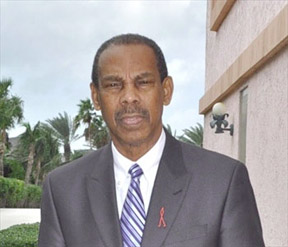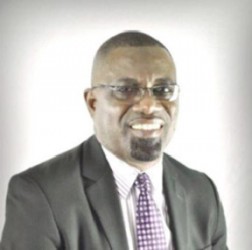The United Nations Secretary General’s Special Envoy for HIV/AIDS in the Caribbean Professor Edward Greene yesterday lauded the new Pan Caribbean Partnership against HIV & AIDS (Pancap) ‘Justice For All’ campaign as a “signal of movement towards getting to zero discrimination.”
His praise came as Pancap kicked off its first consultation in Guyana on the elimination of stigma and discrimination against persons living

with HIV/AIDS, held at the Princess Hotel at Providence, East Bank Demerara.
The campaign will see a series of national community talks between November 2013 and March 2014, with a cross section of stakeholders, including parliamentarians, civil society, the private sector, faith-based organisations and youth. Also, Pancap has scheduled a regional consultation in Jamaica in April of next year.
The campaign is seeking to remove stigma and discrimination against persons living with the HIV/AIDS, in compliance with the United Nations Universal Declaration of Human Rights. According to a statement from Pancap, the objective is to “Achieve one of the goals of the United Nations High Level Meeting Political Declaration (2011)…and uphold the rights the human rights and dignity of all.”
“The Director and staff of the Pancap coordinating unit must be congratulated for conceptualising and rolling out this Justice for all campaign,” Greene said, while opining that the programme would thrust the region closer to ending the reproach. “This scourge is a major stumbling block to our dream for achieving an AIDS free generation,” he added.
He said that he was amazed with the large gathering of Guyanese stakeholder present yesterday, while adding that it was a sign that in Guyana the channels “for dialogue are open.”
“This augurs well for enhancing the family spirit in the form of national, regional and international solidarity to support, care and demonstrate tolerance for those in need regardless of race, class, gender and sexual orientations,” he said, before adding that it was a tenet mirrored by all Pancap partner states.
He suggested that the concord among member states opened a “centre’ for dialogue that they would inevitably agree upon and if there was a cause for disagreement it would be resolved. “The involvement of parliamentarians, the judiciary, the youths, the private sector, civil society and the media in this process will hopefully galvanise broad based multi-sectorial responses that will collectively make a difference to the lives of many,” he further said, while noting his optimism that the inaugural consultation in the Pancap Justice for All programme will act as a catalyst for the movement to achieve the result of Zero discrimination by 2015.
‘An enabling environment’

But the campaign is also faced with challenges. Director of Pancap Dereck Springer said that it is challenged by the UN Millennium Development Goals timeline of 2015 for moving from a disease focused approach to people-centred, healthy society approach and integrating economic growth and social justice.
Springer stated that the epidemic has challenged humanity for over 30 years. “But now there is an opportunity to eliminate it,” he added, while noting that Pancap is driven to achieving the Millennium goal in 2015. “It is an opportunity to usher in an AIDS-free generation. It has propelled us to ensure that we work with all stakeholders to achieve these goals,” he said.
Pancap, he stated, is committed to providing a strong rationale for a strengthened human rights approach at both regional and national levels. The national conversations with Pancap would tackle issues relating to improving treatment accessibility, enhancing the family spirit in the form of national and regional solidarity, eradicating gender inequality including violence against women, girls and children and promoting sexual; and reproductive health and rights. “We are driven by a need to improve an enabling environment, accelerate an HIV/AIDS response, including persons who are more vulnerable and who continue to feel and experience real discrimination in their daily lives,” he said.
Springer noted that the inclination of the faith leaders in Jamaica to commemorate the World AIDS Day and support their cause to eliminate stigma and discrimination is respected and admired. “Hopefully the activity would be replicated throughout the Caribbean with other faith leaders,” he said.
His hope, he added, is to see the programme progress into a “Caribbean road map” that would provide justice for all and develop self-recommendations and concrete actions to defeat the challenges. He also stated that he was delighted by the amount of young adults that participated in the talks.
Progress uneven
Meanwhile, Agriculture Minister and former Minister of Health Dr Leslie Ramsammy said that the campaign is “our” regional programme to ensure that Caricom countries are adhering to the protection of human rights. “The progress in eliminating stigma is uneven but today we have an opportunity to change that,” he stated.
“The Caribbean is posed with the opportunity to end the epidemic and it will take bold actions. But we in the Caribbean are used to taking bold actions,” he added, while urging the creation of a region that is premised on justice for all.
He also encouraged members of Pancap and UN to remember a commitment made to ensure that no child is born with HIV.
“We have not only set goals but we have established a timeline to fulfil the millennium goal… and we are at a stage of achieving that goal,” he said, noting that there was a time when people were pessimistic about the goals, especially as it relates to providing universal treatment for persons living with HIV/AIDS. “Today we are well on the road to achieving universal treatment for people. And Guyana is one of those countries to achieve it,” he said.
He added that Guyana is working to bring its laws into compliance with the UN declaration and urged Guyanese to actively participate in upholding human rights. “It is not new that we are debating human rights….it is old as humanity,” he said.
Currently, HIV/AIDS is one of the leading causes of death in the world. Zimbabwe has the highest percentage of people living with HIV/AIDS, ranking in the top ten, while Haiti ranks at number 25, Jamaica at 31 and Guyana at 36. “We still have a lot more work to do,” Ramsammy said.
A study of stigma and discrimination of HIV/AIDS in Guyana found that people living with HIV/AIDS (PLWHA) suffer extreme stigmatisation from the population, which is more likely to prevent gays and other men who have sex with men and other sexual minorities from accessing certain services. The study suggested that PLWHA debarment from accessing services increases perceptions of discrimination.
According to the World Health Organisation, at the end of 2012 35.3 million people were living with HIV/AIDS and about 10 million were gaining access to antiretroviral therapy. In Guyana, antiretroviral therapy coverage is 89 percent.
Speaking to Stabroek News, Shanti Singh, of the National AIDS Programme Secretariat (NAPS) said that the barrier of stigma and discrimination is hard to break. “It is a difficult barrier to break,” she said, while noting that stigma existed before the AIDS epidemic. However, she called the new campaign ambitious.
“Basically whatever mechanism they put in place…whether they call it justice for change or justice for all. We will need to help curb discrimination against people living with HIV/AIDS,” Nazim Hussain, also of NAPS, told Stabroek News. “Those persons are vulnerable,” he said, adding that there certain laws that violate human rights.
Desiree Edghill of the Artistes in Direct Support said that “those laws” against sexual minority groups and PLWHA force them to hide “under the table.”
“We need to acknowledge them and ensure that they are able to access treatment,” she said, while calling for a revision of laws against people that cause them not to be “free.”




